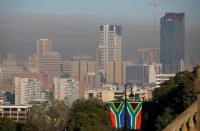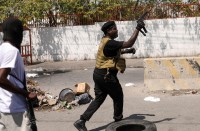KHARTOUM, Sudan (AFP) — Anti-government protests that have rocked Sudan for weeks have left 22 people dead, authorities said on Thursday, as rally organizers called for fresh demonstrations.
Angry crowds have staged hundreds of protests against the regime of President Omar al-Bashir after a government decision last month to triple the price of bread.
The updated death toll included three demonstrators who died Wednesday as rival rallies rocked the capital Khartoum and its twin city of Omdurman, on the west bank of the Nile.
Protesters chanting “freedom, peace, justice” and “revolution is the people’s choice” marched in Omdurman but they were quickly dispersed by riot police firing tear gas.
Police confirmed that three protesters had died in the Omdurman demonstration but did not specify the cause of death.
“An illegal gathering was held in Omdurman and police dispersed it with tear gas,” police spokesman Hashim Abdelrahim said in a statement.
“Police later received reports that three protesters had died and several (were) injured. We are now investigating.”
That raised the total death toll in protests so far to 22 including two security personnel, according to official figures.
New York-based Human Rights Watch said on Monday that at least 40 people including children had been killed in the unrest, citing Sudanese activists and medical workers.
A doctor told AFP late on Wednesday that six protesters were being treated at Omdurman’s main hospital for gunshot wounds.
A group of doctors at the hospital said that police had fired tear gas at the facility.
“There was also shooting inside the hospital,” the group said in a statement, without specifying who had opened fire.
Defiant Bashir
On Thursday, governor of Khartoum Hashim Osman tasked a panel with investigating the incidents at the hospital, his office said.
Bashir and others have blamed violence at the nearly month-long protests on “thugs” and “conspirators” without naming them.
Protest organizers called for fresh demonstrations Friday after midday prayers, including in the town of Atbara where unrest first erupted on December 19.
“After successful rallies on January 6 and 9, we are now calling for a rally on Friday in Atbara,” the Sudanese Professionals’ Association said in a statement.
“We also urge the Sudanese people to continue with their demonstrations in their residential areas,” said the group, made up of doctors, teachers and engineers.
Wednesday’s demonstration in Omdurman came shortly after thousands of people danced and cheered for Bashir at a separate rally held in the capital’s sprawling Green Yard.
“This gathering sends a message to those who think that Sudan will become like other countries that have been destroyed,” Bashir told the crowd.
Crowds chanted “Allahu akbar” (God is greatest) and “Yes, yes, Bashir, we will follow you” at the rally.
“Those who tried to destroy Sudan… put conditions on us to solve our problems, I tell them that our dignity is more than the price of dollars,” Bashir said in an apparent dig at the United States, which had imposed a trade embargo on Khartoum in 1997.
The embargo was lifted in October 2017, but Sudanese officials including Bashir have continued to blame Washington for the country’s economic woes.
‘Persistent’ unrest
Dressed in a khaki shirt and trousers and waving his trademark cane, a smiling Bashir greeted the crowd as men and women whistled and waved flags.
“We are with our leader because our brothers want to destroy our country, but we will save it,” a female supporter told AFP.
More than 800 protesters, opposition leaders, activists and journalists have been arrested since the unrest began, officials say.
Analysts say the protests are the biggest challenge yet to Bashir’s decades-old rule, but remain sceptical of the ability of organisers to garner large crowds.
“Right now, some of the opposition groups and trade unions are trying to mobilise more protests, and probably they are thinking of how to escalate,” said Matt Ward, senior Africa analyst at Oxford Analytica.
“But so far there hasn’t been an escalation, they are persistent but they haven’t risen in intensity in a significant way.”
Britain, Norway, Canada and the US have called for an investigation into the deaths, warning earlier this week in a joint statement that Khartoum’s actions would “have an impact” on its relations with their governments.
Sudan said the concern expressed by the four countries was “biased… and far from reality”.
“Sudan is committed to freedom of expression and peaceful demonstrations,” the foreign ministry said on Wednesday.
© Agence France-Presse







